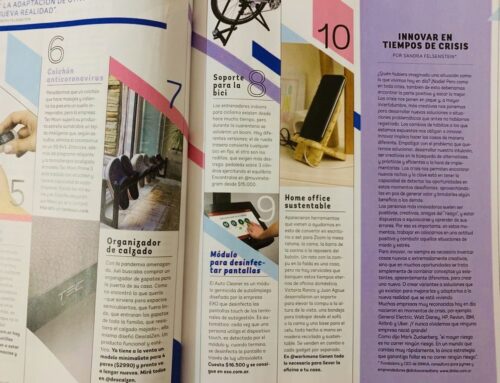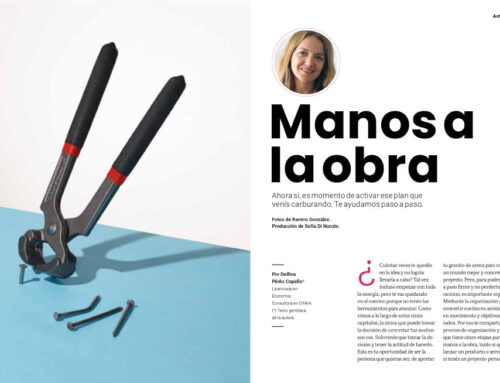How to fall in love with a SME: the keys to the great firms that grow in this immense B2B market
It is crucial to consider the differences in decision making. And seek that the benefit is tangible for small and medium clients.
If societies, self -employed and monotributistas are added, in Argentina there are about 5 million productive units, according to the latest 2017 data of the Ministry of Production and Labor. And of them, 609,000 employ at least one worker in a dependency relationship, but only 1% occupy 200% or more. The rest, of course, are SMEs. Thus, small and medium concentrate 2/3 of formal private employment and gather 44% of GDP, according to the latest national economic census. They are, therefore, a very attractive market for corporations.
DIFFERENT AND NEEDED
However, differences of origin, conception and ways of work between SMEs and large companies often generate difficulties.
"A SME needs enough flexibility of its suppliers, which can accommodate the needs they require and that are often different from those of a large company, where everything is much more standardized," explains Sandra Felsenstein, director of the Dinka consultant, specialized in advising entrepreneurs and SMEs.
Corporations usually have processes and organization charts that establish how hierarchical staff and middle managers should act. In addition, they usually have broad and defined budgets in advance and periodically. In SMEs, on the other hand, they have a family origin or not, the owners usually intervene in most of the operational decisions. And capital is limited and contributed by few people.
In this world of contrasts, despite everything, SMEs and corporations need each other. According to Felsenstein, "if a large company wants to get an SME as a client, you have to be used to working with this type of companies, understand their problems well, and be sure that you can provide a service according to what they need," he explains.
Owner yes, organizational chart
SMEs have logics, cultures, interests and a specific entrepreneurial spirit that differentiate them from other signatures. But current regulations define them by variables that have to do with the number of employees and sales volume. Their reason for being in the market is due to their ability to develop individualized and unintentionally products, and in addition to auxiliary fabric to large companies, provide private sectors and respond to market logics different from those that drive corporations.
According to the Business and SMEs manager of Banco Galicia, in SMEs "the owner has a huge prominence unlike a corporation, where there is an organization chart, a greater degree of professionalism and delegation." That aspect can be beneficial in some situations. Thus, “the advantage of the SME in front of a large company is the proximity of the owner of the company and the employees, which allows to have a different dialogue to raise issues that must be improved,” says Fernando Zack, general manager of Plus Art, a labor risk insurance (art), specialized in that type of clients.
When looking for a supplier, one of the fundamental differences between SMEs and great societies is the power of negotiation. "The corporation, normally, has more than one alternative, and all of them have a desire to sell it; and if the supplier fails, it changes right away," says the director of Sea Consultores and specialist in family businesses. On many occasions, suppliers are chosen according to the name: if the company is well known, it is supposed to have greater support. But according to experts, the fame of a brand does not always entail a good service for SMEs due, again, to little flexibility. "Chicas companies would have to look at the trajectory, history and, above all, ask their colleagues; but SME businessmen are not very affected to ask, they like to make their own decisions," says Antognolli.
Sandra Felsenstein agrees: “The SME is tempted to hire renowned companies and with a lot The "Core Business", such as raw material manufacturers, usually add trust and good relationship.
Even so, SMEs are very different from each other. They vary, of course, in the areas that cover, but also in their conformation, economic power or management form. That aspect, almost always, depends on the philosophy of its direct owners. "The size of our company allows the address to have direct contact with SME entrepreneurs, and that is an added value that we want to conserve," says the general manager of Plus art. While the company manages a high billing volume, its origin is closer to that of an SME, and has a contained accounts number, which they present as a strength. In fact, the company promotes itself as "the ART of the Argentine SME", since it points to that audience.
"Many times, companies hire labor risk insurance just to comply with the law, but do not see all the juice that can be taken to the insurer and the services they can provide," Zack acknowledges.
Because the holders of small firms have little staff to delegate management areas, sometimes that causes a certain degree of improvisation or, at least, little professionalization of these sectors. In that sense, some suppliers can become allies: "The best business we can do as a work risk company, is that, when we negotiate the renewal of the contract, let's raise a reduction of the aliquot; for that we need to work during the twelve months prior in prevention and in the reduction of accidents and litigation," specifies. From these actions, an ART has the potential to train staff and suggest improvements in processes or facilities. On many occasions, the investment that is required to achieve an improvement is low in relation to the risk that does not make it and even results in a decrease in insurance costs. At the same time - and as the main benefit - it is achieved that workers perform in a safer place.
Many times, employees make mistakes due to excess confidence or for a wrong culture. An example of that is when they do not use security equipment, although the company is provided. In those cases, the training given by external personnel to the company are usually much more effective than a simple talk of the owner or a direct superior.
QUESTION OF PRIORITIES
"In the SME girl, the owner has as priorities to sell more and buy better. The rest, in general, is quite postponed: that includes marketing, strategies and finance," says Bouchoux, of Galicia. In family societies, it can also happen that there is an unclear separation between personal finances and those of the company: “Many companies fall more for financial or strategies, than for economic or sales reasons,” highlights the head of SMEs from the bank. And another contribution helps break the stereotype, when he explains that girl organizations seek personalized treatment with banking institutions: "One would expect us to, as a bank, the first thing that an SME is going to ask for is money or financing; but that does not happen," he says. On the contrary, many of the small companies are approaching in search of advice for financial management. To have context: in the world, only 25% of SMEs take credits. But in Argentina, due to the fluctuating characteristics of the market, that figure is estimated at 15% (although strictly speaking it is difficult to establish an exact calculation, since some entrepreneurs ask for personal credits to invest in their companies).
In the specific case of the Bank of Galicia, the entity counts among its clients with 1,000 corporations, 5,000 large companies and nothing less than 275,000 SMEs, including small businesses. In this way, more than 95% of its business clients (excluding the agricultural sector), consist of small and medium signatures. Which represent, in turn, 40% of the volume of non -personal deposits. However, while corporations usually carry out their investments more efficiently, for Bouchoux the financial inefficiency of SMEs causes idle deposits at various times, an inconvenience that is more detrimental in times of high inflation. In this sense, the Executive recommends, professionalizing, advising and resorting to suppliers. "We have tools for finance to take a more leading role and allow better use of liquidity." For that, he assures, in addition to the self -management options, they provide personal and telephone advice due to the valuation that SMEs give to that type of service.
In parallel, in 2012 the entity created "good businesses" (www.buenosnegocios.com), An online site with information for SMEs about the actuality of the sector, available help tools, human resources and finance among other areas. There is also a space where the "community" of companies can communicate with each other and establish various agreements: "We have about 300 thousand visits per month, of which half are companies from abroad," says Bouchoux.
When a service is provided to a corporation, in the background a solution is provided to the person who leads the position or department in question. On the other hand, when working with smaller signatures, it is often dialogued with the owner or one of the owners directly: the imprint of the company is, in short, that person's philosophy. That is why it is essential to generate empathy and understand the specific needs that this entrepreneur seeks, and have sufficient flexibility to respond to them.
The Dinka consultant confirms "one deals with people. And in an SME they weigh the problems that we are going to solve the people who direct it. It is very important to understand what is the added value that we are going to give them, according to the imprint of that company."
For advisor Antagolli, it is key to generate a climate of trust. That is because entrepreneurs in the SME sector are usually "very emotional." At the same time, if there is something that does not remain in a small company is time: in that sense establishing negotiations through an employee without sufficient training or without decision -making, can become an almost impossible error to trace.








